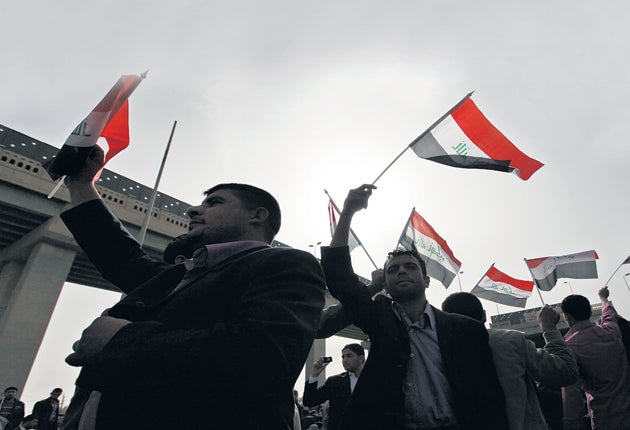Fiercely fought campaign ends with Iraq's divisions deeper
No matter who wins Sunday's election, months of rancorous talks loom over who is to be the next prime minister

Iraqis go to the polls tomorrow in an election which has led to increased tensions between the country's three main communities after a fierce campaign in which some candidates were banned as former supporters of Saddam Hussein's party.
Iraqis who are among the two million refugees in Syria and Jordan started voting yesterday, and in Baghdad the security forces will try to prevent suicide bombers penetrating their checkpoints. Twelve people were killed by bombs in Baghdad on Thursday and 33 in Baquba, the capital of Diyala province north-east of the capital, on Wednesday.
In Diyala, the Islamic State of Iraq, the umbrella organisation which is a front for al-Qa'ida, put out leaflets threatening to kill those who voted. A single winner is unlikely to emerge in the election for the 325-member parliament, leading to rancorous bargaining in the coming months over who is to be the next prime minister and who will hold ministerial posts in the incoming government.
The Prime Minister, Nouri al-Maliki, is expected to do well but possibly not well enough to hold his job against a coalition of Shia parties. He has also been on increasingly bad terms with the Kurds, who have been an essential part of governing coalitions.
The latter stages of the election campaign were dominated by the blacklisting of candidates alleged to have links with the Baath party of the old regime. This purge expanded into a more general attack on officials, army officers and even state oil company executives who were linked to the Baath whose leadership was predominantly Sunni. It is not clear how far the investigations are an electoral ploy and how far they will be continued after the election. If de-Baathification is seen as an excuse for general discrimination by the Sunni community it will become even moredisaffected.
The results in Iraqi elections are usually slow to emerge and likely to be disputed. Mr Maliki's opponents in the two main religious parties – the Islamic Supreme Council of Iraq and the followers of the Shia cleric, Muqtada al-Sadr – were able to combine last year despite previous differences. They may also have benefited from the Baathist resurgence scare frightening the Shia and making them more likely to vote. Unlike the last elections in 2005, the Shia Grand Ayatollah Ali al-Sistani has not expressed any opinion on how people should vote.
Mr Maliki's own Dawa party had only 10 seats in the last parliament but the Prime Minister will be able to draw on the power of the state, its $60bn (£39.7bn) in oil revenues and several million jobs. The government was able to use its patronage to its own advantage in the provincial election in January 2009 in which Mr Maliki did well. The state is by far the biggest employer in Iraq and nobody gets a job even as a primary school teacher without a letter from a party connected to the government.
The US government has been nervously eyeing the election in case it might derail its plans for a withdrawal of all American combat troops by the end of August and all remaining forces by the end of 2011. The number of US troops in Iraq has already fallen to 96,000. The US tried hard to prevent the blacklisting of Sunni leaders but without success.
It is unlikely that the US military withdrawal will be delayed because it is being done under a Status of Forces Agreement agreed by President George Bush before he left office. President Barack Obama will not want to admit things are not going as well in Iraq as he had suggested. Negotiating the US withdrawal is also presented by the Maliki government as one of its main achievements. The most important remaining US operational role is in joint patrols in areas disputed between Arabs and Kurds in northern Iraq.
In the last days of the campaign, the government suddenly announced that it was re-engaging 20,000 army officers from the old regime. The move is probably a sop to the Sunnis and in keeping with a system in which most of the government's oil revenues go on paying a large security force and a bloated civilian bureaucracy, leaving little money for investment.
Join our commenting forum
Join thought-provoking conversations, follow other Independent readers and see their replies
Comments